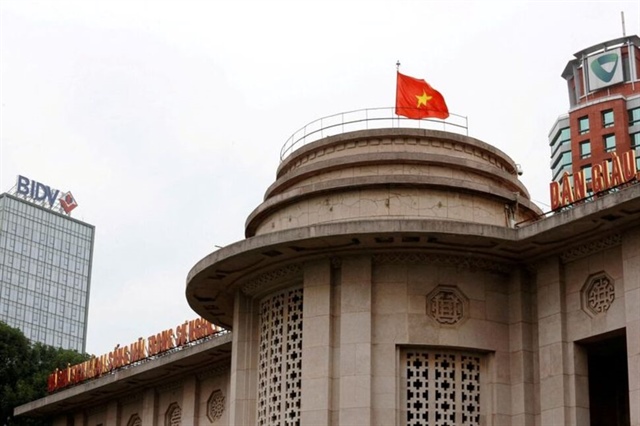|
Vietnam tightens limits on investors' stakes in banks
Vietnam's legislature on Thursday approved new rules that lower the maximum stake investors can hold in domestic banks, a move aimed at reducing risks of market manipulation, but that could make investment in lenders less attractive.

A file photo of a Vietnamese flag flying atop the State Bank building, near the Vietcombank and Bank for Investment and Development of Vietnam buildings, in central Hanoi, Vietnam November 23, 2017. Photo: Reuters
|
Under the reform, which will take effect from July this year, institutional shareholders, such as investment or pension funds, will be allowed to hold up to 10 percent of a bank's equity, down from the current 15-percent limit.
More than 90 percent of the National Assembly deputies agreed with the amended law.
The move followed the unveiling in late 2022 of Vietnam's largest financial fraud to date under which real estate tycoon Truong My Lan is accused of siphoning off $12.5 billion from one of Vietnam's largest private banks, Saigon Joint Stock Commercial Bank (SCB), thanks to her effective control of the lender through nominees.
Supporters of the new rules expect that tighter limits on ownership could make it harder for similar manipulation to happen again, but opponents warn that may not be effective as existing caps had not prevented fraud.
Critics, including lawmakers, also cautioned during public debates that the reform could have a negative effect in reducing investments in banks at a time when Vietnam's banking system faces an increase in bad loans and risks of spillovers from a lingering property sector crisis.
The new measures go against the recurrent request from foreign investors to lift or remove an existing 30-percent cap on total foreign ownership of banks.
That cap is not tweaked under the reform, but the tighter limit on institutional shareholding could further stifle foreign investment as foreign investors are more often closer to the current maximum than domestic ones.
Partly taking into account these concerns, legislators decided not to lower another limit on individual ownership that remains capped at 5 percent despite an initial plan to lower it to 3 percent.
The new rules also give more powers to Vietnam's central bank to quickly intervene in case of large cash withdrawals from banks or when lenders show early signs of distress.
The SCB scandal led to a bank run that forced the central bank to take over the lender.
Tuoi Tre News
|